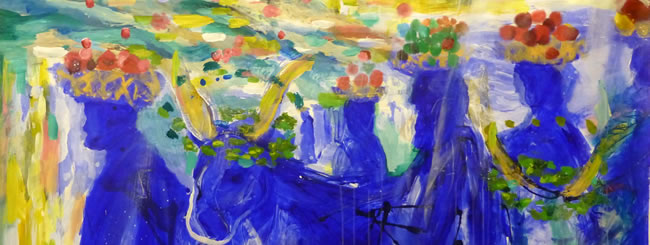Year Course Shabbat Shalom, Soon-to-Be Year Coursers

Hello from Israel! I wanted to share a short idea on this weeks Torah portion, Ki Tavo, as we enter the last Shabbat before our Year Course journey begins.
With the Israelites on the cusp of entering the land of Israel and the 40 years of wandering almost over, they are told that once the land has been settled the farmers must “take the first of every fruit…put it in a basket and go to the place that your God, will choose” (Devarim 26:2). This Mitzvah is known as bikkurim and required the first fruits of the harvest to be brought to the tabernacle, and then eventually the Temple, as soon as the land had been settled.
Having this command juxtaposed with the moment the land was settled seems strange at first because one would assume there were more pressing issues at hand. However, by looking at the Mitzvah closely we can begin to gain an understanding as to why this was a priority for the Children of Israel.
The commandment to bring the first fruits was more than just a ritual sacrifice but symbolic of the Jewish people’s new reality in the Land of Israel. Once they entered Israel, the Jewish people went from being wanderers and victims to masters of their own destiny in their own land. This gave them the opportunity to function as individuals within a society and fulfil the potential they were destined for since the days of Abraham. By taking the literal fruits of the land and offering them to God, the Jewish people were demonstrating that they were now able to thrive in the promised land, recognising its potential, and showing a sense of gratitude for what they had been given.
It’s interesting to note that many Zionist thinkers pinpoint this particular portion of the Torah as mirroring the creation of the state of Israel and everything that came with it, due to the seismic change in our peoples reality.
It also seems appropriate that this portion falls as your journey in Israel is about to begin. The start of Year Course is an extremely exciting time with so many opportunities for you to live, learn and grow in our homeland. I hope that you are able to maximise each and everyday you are here, while showing gratitude to all those that have brought you to this incredible time and place in your lives.
To echo what Moses says to the Jewish people at the end of Ki Tavo, that once they enter Israel they will have “a heart to know, eyes to see and ears to hear” (Devarim 29:3), may you all also have experiences of lifetime that are only possible in this unique and incredible country.
Shabbat shalom and looking forward to meeting and learning with you all,
Rabbi Adam Drucker